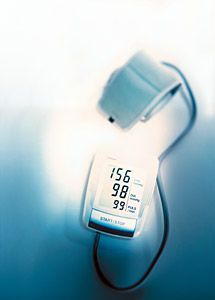If you ask the average adult what vitamin C is used for, the most common reply has to do with the common cold.
Recently vitamin C was in the headlines regarding blood pressure. Here is a sample: "Vitamin C Has a Modest Effect on Lowering BP," "Vitamin C Is Associated With Significant Reductions in BP," "Vitamin C May Lower BP" and "Vitamin C regulates BP." It only took a couple of minutes to confirm that the various headlines concerned the same study. Once I retrieved the full paper,1 I only had to read a few lines before it became apparent that none of the people who wrote articles about this study in the popular press read anything more than the abstract or a press release.
The Study
Researchers from Johns-Hopkins did a meta-analysis of vitamin C trials and blood pressure. Twenty-nine studies published between 1982 and 2010 met the inclusion criteria, with subject populations ranging from 10 to 120 subjects. The average length of intervention was two months. The doses of vitamin C used were as follows:
- 10 studies used 500 mg/d
- 7 studies used 1,000 mg/d
- 2 studies used 400 mg/d
- 2 studies used 2,000 mg/d
- The remaining eight studies used 4,000, 3,000, 1,500, 1,250, 515, 300, 200 and 60 mg/d, respectively.
Results
 Systolic BP: In 22/29 studies, vitamin C supplementation lowered systolic BP to varying degrees. Three of 29 studies showed no change using 1,000, 500 and 500 mg/d doses, and four of 29 studies showed elevation of systolic BP using 4,000, 2,000, 1,500 and 1,000 mg/d doses, respectively.
Systolic BP: In 22/29 studies, vitamin C supplementation lowered systolic BP to varying degrees. Three of 29 studies showed no change using 1,000, 500 and 500 mg/d doses, and four of 29 studies showed elevation of systolic BP using 4,000, 2,000, 1,500 and 1,000 mg/d doses, respectively.
Diastolic BP: In 18/29 studies, supplementation with vitamin C lowered diastolic BP to varying degrees. Five of 29 studies showed no change using vitamin C doses of 1,500, 1,000, 1,000, 500 and 500 mg/d, respectively; six of 29 studies showed elevation of diastolic BP following supplementation with 4,000, 2,000, 1,000, 500, 500 and 300 mg/d, respectively, of C.
Comment
Analyzing the actual data was interesting for a number of reasons. Although every summary article and commentary about this paper in the popular press called 500 mg of vitamin C a "high dose," when we look at the amount of vitamin C used in each study, we see that higher doses were not necessarily better. In fact, the study that used the highest dose (4,000 mg/d), and one of the two studies that used the third highest dose (2,000 mg/d), raised both systolic and diastolic blood pressure. Conversely, the second highest dose used (3,000 mg/d) and the second 2,000 mg/d study both lowered blood pressure.
What was most ironic was that I discovered, after reading the entire meta-analysis, that rather than answering the questions raised from the press release-based articles, I was left with even more questions (as I am sure anyone who reads this article is), which future studies will hopefully answer.
In the meantime, I will stick to my general vitamin C recommendation of 3 mg per pound of body-weight, which for the average person, comes out to around 500 mg/day.
Reference
- Juraschek SP, Guallar E, Appel LJ, Miller ER. Effects of vitamin C supplementation on blood pressure: a meta-analysis of randomized controlled trials. AJNC, 2012;95(5):1079-1088.
Click here for previous articles by G. Douglas Andersen, DC, DACBSP, CCN.





